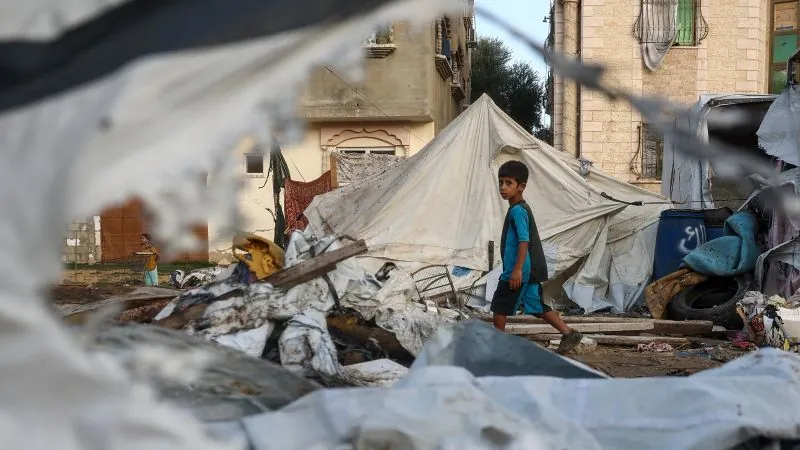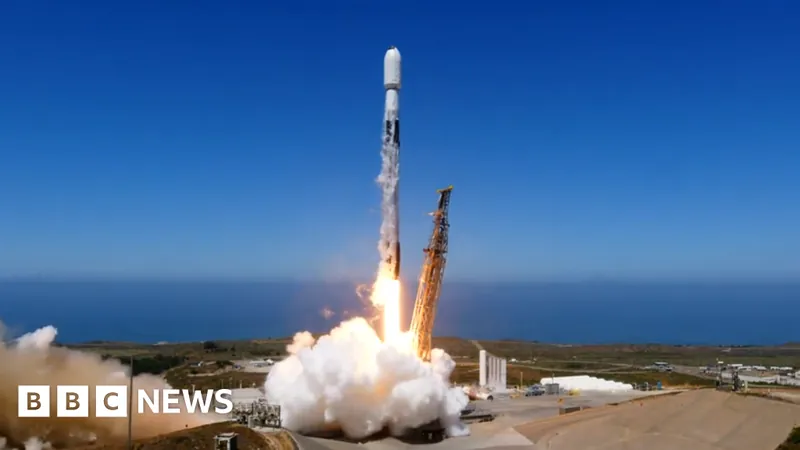
U.S. Threatens Israel with Military Aid Cuts Unless Humanitarian Crisis in Gaza Improves
2024-10-15
Author: Lok
In a groundbreaking letter, the Biden administration has warned the Israeli government that its military assistance may be at risk unless significant improvements are made in the humanitarian situation in Gaza within the next 30 days. This stern ultimatum underscores the U.S. commitment to addressing the crisis in the region amidst escalating tensions.
The letter, dated October 13, was jointly authored by Secretary of State Antony Blinken and Secretary of Defense Lloyd Austin. It was officially directed to Israeli Minister of Defense Yoav Gallant and Minister of Strategic Affairs Ron Dermer. This communication highlights the urgency of the situation, urging Israel to take “urgent and sustained actions” to alleviate the dire humanitarian conditions.
Since the onset of the conflict earlier this year, aid deliveries to Gaza have plummeted by over 50%, with September witnessing the lowest aid figures of any month in the past year. The United States is not only expressing deep concerns but is also asserting that Israel must adhere to its commitments made earlier in the year regarding the facilitation of aid.
The deadline imposed by the U.S. comes in the aftermath of the upcoming presidential elections on November 5, adding a layer of political complexity to the situation. Despite this warning, the U.S. has continued to provide military assistance to Israel, including advanced air defense systems, with U.S. troops arriving in the region as recently as Monday.
The demands from the U.S. are extensive and detail specific actions required from Israel. They include the allowance of a minimum of 350 trucks per day to cross into Gaza through key checkpoints and the establishment of a fifth crossing. Humanitarian pauses across Gaza must be implemented to facilitate necessary vaccinations and aid distribution for the next four months. Furthermore, the U.S. is pushing for increased mobility for residents within the Al-Mawasi humanitarian zone and enhanced security for aid convoys.
In a continuation of vigor, the letter also mandates that the Jordan Armed Forces corridors must be functioning at optimal capacity, ensuring consistency in aid flow to the beleaguered region.
To foster accountability, Blinken and Austin have proposed a new communication channel to discuss civilian harm incidents, with the inaugural meeting set to take place at the end of the month.
Israeli military operations in northern Gaza have intensified recently, leading to calls for civilian evacuations southward, where over one million displaced Palestinians are already seeking shelter. The UN's World Food Programme has issued stark warnings regarding the 'disastrous impact' that these military actions are having on food security for families within Gaza.
The U.S. leaders emphasized that the actions taken by the Israeli government are exacerbating the humanitarian crisis. They pointed to policies that have: - Halted commercial imports, - Denied or severely limited nearly 90% of humanitarian movements between northern and southern Gaza, - Imposed harsh restrictions on dual-use items, - Incited lawlessness and looting.
However, it appears that Israel is already responding to the U.S. letter, at least in part. Just a day following the letter’s dispatch, COGAT, the Israeli agency responsible for managing aid policies, shared images of aid trucks making their way into Gaza. They publicly stated that 30 trucks entered northern Gaza through the Erez Crossing, insisting that humanitarian aid is not being obstructed.
Amid mounting pressure and scrutiny, the Israeli agency emphasized its commitment to allowing aid while simultaneously pursuing military action against Hamas.
As the situation continues to unfold, the world watches closely. Will Israel comply with U.S. demands to avoid cuts to military aid, or will the humanitarian crisis in Gaza deepen further? The coming weeks are crucial, and all eyes will be on this volatile situation.



 Brasil (PT)
Brasil (PT)
 Canada (EN)
Canada (EN)
 Chile (ES)
Chile (ES)
 España (ES)
España (ES)
 France (FR)
France (FR)
 Hong Kong (EN)
Hong Kong (EN)
 Italia (IT)
Italia (IT)
 日本 (JA)
日本 (JA)
 Magyarország (HU)
Magyarország (HU)
 Norge (NO)
Norge (NO)
 Polska (PL)
Polska (PL)
 Schweiz (DE)
Schweiz (DE)
 Singapore (EN)
Singapore (EN)
 Sverige (SV)
Sverige (SV)
 Suomi (FI)
Suomi (FI)
 Türkiye (TR)
Türkiye (TR)